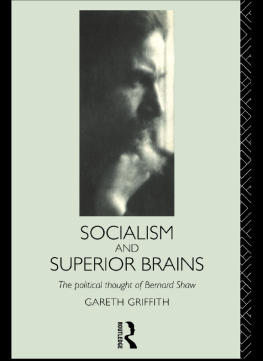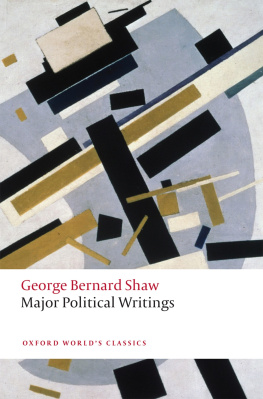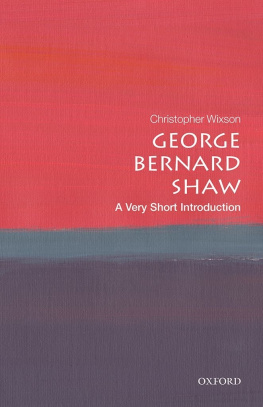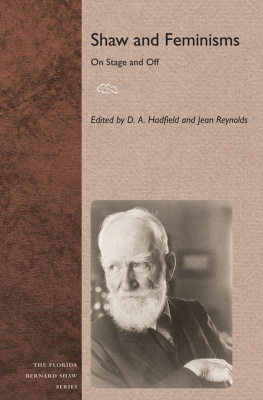This edition published in the Taylor & Francis e-Library, 2003.
All rights reserved. No part of this book may be reprinted or reproduced or utilized in any form or by any electronic, mechanical, or other means, now known or hereafter invented, including photocopying and recording, or in any information storage or retrieval system, without permission in writing from the publishers.
PREFACE
I have four aims in writing this book. First, I wish to offer a comprehensive and critical account of Shaws political thought which is of value both to specialists in the field as well as to students and general readers perhaps coming to these ideas for the first time. Central to the work is the understanding that, while Shaw is not a major figure in the history of social and political thought, he was extremely influential in the development and dissemination of socialist and progressive ideas in Britain and beyond for over half a century. He made a difference, albeit of a kind that cannot be expressed in quantitative terms. A critical assessment of his political thought is essential to a complete picture of social and political argument in the modern age. The lack of a comprehensive study of this kind prompted this work and guided its purpose.
Second, my aim is to characterize Shaws thought, or, more precisely, to explain the methods he employed, the levels of abstraction at which his thought operated, and the intentions which inspired his work. He assumed many roles as a thinker, inter alia that of artist, pamphleteer, philosopher and clowning prophet. Was he a serious thinker, or a devils advocate? Were his ideas intended to transcend the context in which they were formulated? These are among the perennial questions which are asked of Shaw. This study characterizes his thought not in terms of political theory but as a form of political argument, inherently controversial, having regard to context and audience, but not necessarily intended to function purely within the framework of controversy.
My third aim is to present a picture of the development of Shaws thought without seeking to offer a standard intellectual biography. I should explain myself. In order to show the interrelations, the continuities and discon-tinuities in Shaws work, and in part to suggest why he is a serious if not wholly successful thinker, I have chosen to organize this study along thematic lines. In the light of the sheer variety of Shaws interests, interspersing discussion of his views on such issues as the state and sexual equality with consideration of the totality of his concerns in any period of his life would have led, I believe, to a disjointed and unsatisfactory critical account. My aim, therefore, has been to integrate the contextual and biographical elements into a form of presentation which transcends their limitations from the standpoint of critical analysis.
My fourth aim is to show the extent to which Shaws work is a matrix of creative contradictions and, further, to indicate the representative quality of these for socialism and, more tentatively, for modern culture generally. In developing this representative theme, I acknowledge that I have not always explored the connections between Shaws utterances and their wider linguistic context to an extent that would satisfy some exponents of the history of ideas. Part of the difficulty here is that a comprehensive study of that sort would require detailed analysis of almost every facet of modern history and culture from around 1870 to 1950; perhaps, too, its emphasis would be different, having as its aim a portrayal of the intellectual and political movements of the period, and using Shaws intellectual odyssey primarily as the frame for that portrait. In this study, on the other hand, Shaw dominates the canvas.
I am indebted to the Society of Authors, acting on behalf of the Bernard Shaw estate, for granting permission to quote from copyright material. Parts of first appeared in History of Political Thought and Review of International Studies respectively, and I am grateful to the publishers for permission to use them here.
An earlier version of this work was submitted as a doctoral dissertation, and my first acknowledgement is to my supervisor, Professor Paul Wilkinson, for his encouragement and advice. I should also like to thank Bob Osgerby, with whom I taught an MA course on Politics and Literature at the City of London Polytechnic, for his valuable insights into Shaws plays; Dan H. Laurence for his help in tracking down sources relating to Shaws ideas on the coupled vote; Belinda Yuen for typing the final draft of the manuscript; and my wife Sue who helped prepare the manuscript and provided such affectionate support during the years of its making.
Gareth Griffith
Sydney, Australia Day, 1992
INTRODUCTION
Life levels all men: death reveals the eminent.
(Shaw 1931f:222)
Usually George Bernard Shaw is thought of as a playwright: author of such works as Saint Joan and Major Barbara; winner of the Nobel Prize for Literature in 1925. Failing that, his reputation rests on his scintillating work in music and drama criticism. What is sometimes overlooked, in the popular perception of him at least, is that he first achieved prominence in public life as a leading member of the Fabian Society, serving on its executive committee for over twenty years, acting as resident propagandist and original thinker, often tackling neglected themes. Even after he resigned from the executive in 1911 his interest in politics and political ideas never flagged. Only now it was developed more in his capacity as an independent thinker or world statesman. His achievement was considerable.











